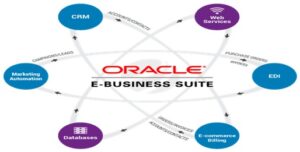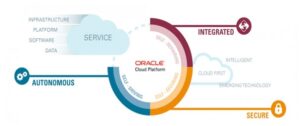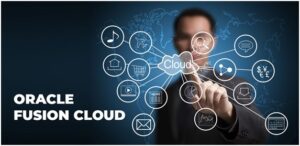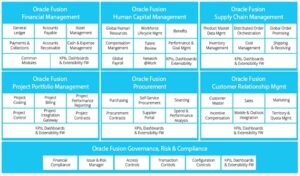Key Difference Between Oracle Fusion, Oracle Cloud And Oracle E-Business Suite
-
June 11, 2021
- Posted by: Pradeep
- Categories: Oracle ERP, Oracle ERP Cloud, Oracle Fusion, Oracle Fusion ERP
No Comments
- June 11, 2021
- Posted by: Pradeep
- Categories: Oracle ERP, Oracle ERP Cloud, Oracle Fusion, Oracle Fusion ERP

For business units, selecting an ERP is a crucial task. It requires time, money, know-how, and expertise. ERP can be either on-premise or Cloud. On-premise ERP is the one which has to installed locally and is costlier than the Cloud ERP which comes already set up, the businesses only have to pay the subscription fee.
Moving from On-premise to cloud can save the businesses their cost and gives a quick return on investment. It also allows for greater scalability and better innovation. It also gives easy integration of other technologies like analytics, mobility and special tools.
In this article, we are going to discuss the tech giant Oracle’s ERP solution, Oracle Fusion, Oracle Cloud and Oracle E-Business Suite and the difference among them.
E-Business Suite (Ebs) R12

Oracle EBS was launched in February 2007 by Oracle Corporations. It is an on-premise ERP solution that can be handled from a single site and the user has its full control. The current version of Oracle EBS is R12. It includes the company’s ERP (Enterprise Resource Planning) as well as Supply Chain Management (SCM) and Customer Relationship Management (CRM) applications. The companies can select any combination of applications as they are licenced separately as per their business requirement.
The applications found in Oracle EBS are:
- Oracle CRM
- Oracle Financials
- Oracle HRMS
- Oracle Logistics
- Oracle SCM
- Oracle Transportation Management
- Oracle Warehouse Management System
- Oracle CRM
Oracle CRM is the application which allows or helps the business to increase its customers and provide proper customer services. It is a front-office function which includes functions like marketing, order capture, contacts, field service and call centre services.
- Oracle financials
This application includes functions like general ledger, receivables, payables, fixed assets, treasury, portfolio management, self-service expenses and a business analyser.
- Oracle HRMS
Oracle human resource management system provides all hr related functions like recruiting, time management, compensation, pay roll and training. The hr data can be easily extracted from the ebs HRMS suite as it is fully integrated with other ebs applications.
- Oracle logistics
Oracle logistics helps keep track of the products in the warehouse and the warehouse capacity. It can create schedules for the demand in warehouse and production that is or will be constraint-based.
- Oracle SCM
Supply chain applications help the business in keeping track of the shipment and to analyse market requirements and plan their next move. It offers industry-specific solutions like product development, sales and operations planning, transportation and supply management.
- Oracle transportation management
It provides execution capabilities and transportation planning. Transportation and freight payment get integrated with this application and it also provides customer service and asset management.
- Oracle warehouse management
It can provide the efficient use of goods, warehouse space and employees. It delivers an accelerated flow of products by supply chain by reducing lead time and releasing working capital, cross-docking, yard management, inbound planning and pick-by-line.
Features:
- Global workforce scheduling capabilities
- Automated time management system
- Forecast labour and workforce demand
- Capture time worked
- Track schedules
- Define and assign schedules to meet business objectives
- Adhere to labour laws and pay rules.
Oracle Cloud

Oracle Cloud is a database company’s public cloud service offering. A cloud is a type of od ERP in which the users only have to pay the subscription fee to deploy the services. The ERP is already set up and the maintenance and upgradation of the ERP are done by the vendor only.
Oracle has a global network of managed data centres and uses the cloud services to provide cloud applications, servers, storage and processing on this global network. Oracle Cloud provides Infrastructure as a Service (IaaS), Platform as a Service (PaaS), Software as a Service (SaaS) and Data as a Service (DaaS). These services are used to build, deploy, integrate and extend applications in the cloud.
Oracle Cloud provides four types of services. These are:
- Infrastructure as a service: the IaaS provides the following services
- Compute
- Storage
- Networking
- Governance
- Database
- Load balancing
- Edge service
- Fast connecting
- Platform as a service: the PaaS provides following services
- Data management
- Application development
- Integration
- Business analytics
- Security
- Management
- Content and expertise
- Software as a Service: the SaaS provides the following services
- Customer experience
- HCM
- ERP
- SCM
- Internet of Things (IoT)
- Enterprise Performance Management (EPM)
- Blockchain applications
- Data
- Data as a Service (DaaS): this is known as the Oracle Data Cloud. It analyses and aggregates consumer data through Oracle ID across channels and devices to create an understanding of consumers in cross channels.
Oracle Fusion Cloud

The ‘fusion’ word refers to a combination of different things collected together. Oracle fusion cloud was announced in 2105. Oracle corporation bought JD Edwards, People Soft, Seibel systems and incorporated the specialities of each of their databases and combined it with the Oracle Cloud to form Oracle Fusion Cloud. There are many Oracle ESB modules in the Fusion application to categorize different business functionalities. It is the most exciting product of the Oracle application family.
Oracle Cloud and Oracle Fusion Cloud are termed as same.
Oracle Fusion applications are used in various businesses, including:
Difference Between Oracle Fusion Cloud And Oracle Ebs
| ATTRIBUTE | E-BUSINESS SUITE | FUSION CLOUD |
| Data model | Java server faces and forums | Java server faces+ Oracle application development framework |
| Database | Database 10g | Database 11g |
| Features | Cost is feasible and provides advanced features | It has the best module |
| Business intelligence | Oracle Discoverer | Oracle Business Intelligence Enterprise Edition |
| Efficiency | A proven Oracle enterprise | Next-generation enterprise |
| Cost | Requires investment in installation and takes up a lot of money | The only subscription fee is required to pay |
| Time | It takes almost a week or more to deploy | Can be set up within days |
| Expertise | Requires professional to maintain | The maintenance and upgradation are done by the vendor |
| Control | The user is the sole controller of the system | The control is in the hands of the vendor |
| User interface | Has an older user interface which is not fast | Has an updated user interface which is easy to work on |
Conclusion
Oracle EBS is different from Oracle Fusion Cloud. Both has its merits and demerits. But still, the fusion cloud is much more advanced and has the best user interface. In the competitive era, it is wise to use fusion cloud or cloud in your business because it can be accessed in different devices such as mobiles, laptops etc. this is much more useful when the employees want flexibility. But if you want full control then EBS is the best choice. All in all, Oracle is the leader when it comes to databases



